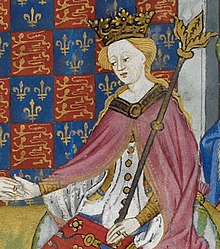Margaret of Anjou

Margaret of Anjou (* March 23 or March 24, 1430 in Pont-à-Mousson ; † August 25, 1482 at La Vignolle Castle ) was the daughter of René of Anjou , later King of Naples and Titular King of Jerusalem , and of Isabella of Lorraine . She was married to Heinrich VI. , King of England .
Life
On April 23, 1445, it was the Treaty of Tours (1444) between Charles VII , King of France , and Henry VI. according to, married to the latter. In 1453 she gave birth to a son named Edward . Beautiful, witty and enterprising, she soon knew how to make a big impact. She disempowered Humphrey, Duke of Gloucester , her husband's uncle. Since Heinrich was often mentally deranged, she took over the government together with the Duke of Suffolk , after his death with Edmund Beaufort, 1st Duke of Somerset . In 1448 she also founded Queens' College in Cambridge .
From 1455 involved in the Wars of the Roses between the House of Lancaster , to which her husband belonged, and the House of York , which accused her of being foisted on her son Edward, Margaret developed an extraordinary mental strength and dominated politics in the same way as the army. Richard Plantagenet, 3rd Duke of York and Leader of the House of York, died on December 30, 1460 against her troops at the Battle of Wakefield . Likewise, on February 17, 1461, she overcame Richard Neville, 16th Earl of Warwick in the Second Battle of St. Albans . Her attempts to oust the son of Richard Plantagenet, Edward IV, who had been raised to the throne by Warwick , and to enforce her son's rightful claim to the throne, were unsuccessful. After the terrible defeat of the Lancaster party at Towton (March 29, 1461), she fled via Scotland to France to see Louis XI. who granted her 2,000 soldiers on condition that she was extradited from Calais . With this army strengthened by English refugees, she and her son Edward invaded Northumberland from Scotland , but had to flee to the mainland again in 1463 after the failure of this advance. Here, Louis XI. she dated her mortal enemy Warwick in 1470, who had switched sides. Warwick, called the kingmaker, then expelled Edward IV and set Henry VI. back on the throne.
On the day of the Battle of Barnet (April 14, 1471), in which Warwick fell, Margaret landed at Weymouth in England, but was defeated with her followers by Edward IV at the Battle of Tewkesbury (May 4) and fell by Sir William Stanley into the hands of their opponent. Her son had been killed on the run, her captive husband Henry VI. was murdered on May 21st in the Tower of London . She was later imprisoned at Wallingford Castle . It was not until 1476, on the intercession of Louis XI. released from custody, returned to France and died there. She is buried in Angers Cathedral.
reception
Giacomo Meyerbeer created the opera Margherita d'Anjou , which premiered at the Teatro alla Scala in Milan in 1820.
progeny
With Heinrich VI. Margaret had a child:
- Edward , Prince of Wales , (born October 13, 1453 , † May 4, 1471 at the Battle of Tewkesbury ). He was born with the title Duke of Cornwall .
Edward was married in December 1470 to Anne Neville , daughter of Richard Neville, 16th Earl of Warwick , and Anne Beauchamp . It is not clear whether this marriage was consummated.
ancestors
literature
- Dockray, Keith: Henry VI, Margaret of Anjou and the Wars of the Roses: a source book, Stroud: Sutton, 2000, ISBN 0-7509-2163-3
Web links
- Margaret d'Anjou on thepeerage.com , accessed July 26, 2015.
Individual evidence
- ^ Diana ES Dunn: Margaret of Anjou . In: Oxford Dictionary of National Biography (ODNB). Vol. 36 (2004), pp. 638-646, here: p. 638.
- ↑ H. Vollrath & N. Fryde (eds.): The English Kings in the Middle Ages; From William the Conqueror to Richard III. Beck, 2004, ISBN 3-406-49463-3 , p. 187; Powicke & Fryde: Handbook of British Chronology. Second Edition, London, 1961, p. 37
- ↑ H. Vollrath & N. Fryde (eds.): The English Kings in the Middle Ages; From William the Conqueror to Richard III. Beck, 2004, ISBN 3-406-49463-3 , p. 192
| predecessor | Office | successor |
|---|---|---|
| Catherine of Valois |
Queen Consort of England 1445–1461 |
Elizabeth Woodville |
| Elizabeth Woodville |
Queen Consort of England 1470–1471 |
Elizabeth Woodville |
| personal data | |
|---|---|
| SURNAME | Margaret of Anjou |
| ALTERNATIVE NAMES | Margaret of England |
| BRIEF DESCRIPTION | English queen and founder of a college |
| DATE OF BIRTH | March 23, 1430 or March 24, 1430 |
| PLACE OF BIRTH | Pont-à-Mousson |
| DATE OF DEATH | August 25, 1482 |
| Place of death | La Vignolle Castle |
